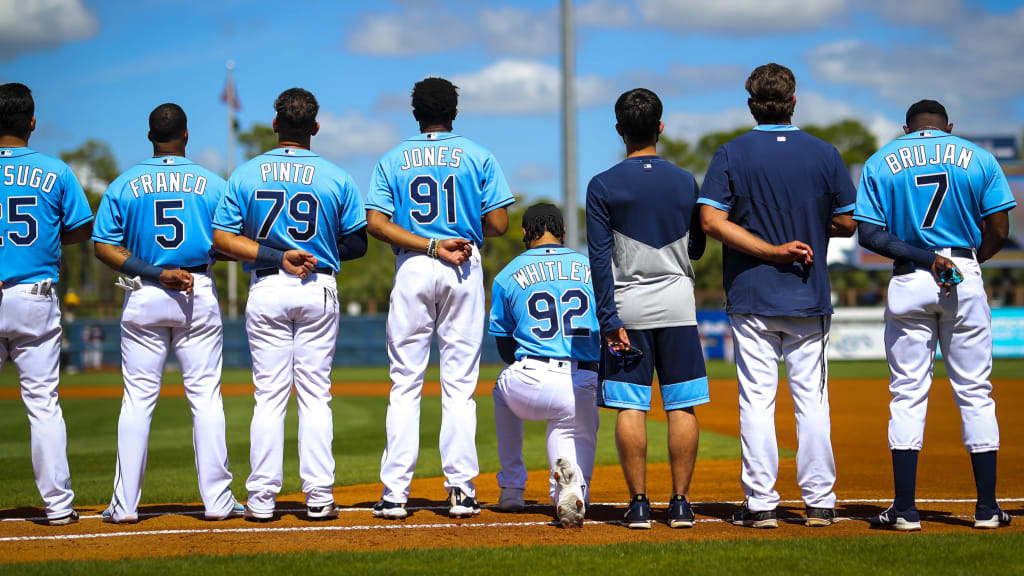
PORT CHARLOTTE, Fla. -- On Opening Day last season, Major League Baseball teams and players came together to show their support for the social justice movements that swept the country over the summer. Players wore Black Lives Matter T-shirts during batting practice, knelt before the national anthem and lined up on the field holding 200-yard black cloths in league-wide displays of unity.
There were no planned pregame ceremonies when the Spring Training slate of games began on Sunday afternoon. But those issues were no further from Rays prospect Garrett Whitley’s mind than they were a year ago.
Whitley said he still wants to draw people’s attention to issues of racial inequality and injustice. That’s why the 23-year-old outfielder took a knee in his No. 92 jersey during the national anthem at Charlotte Sports Park before the Rays' 9-7 win over the Braves.
“Obviously I support them. I mean, they directly affect me,” Whitley said. “Everything was going on last summer, and you couldn't go online without seeing something. As time went on, you started to see less and less of it. And I just don’t want people to forget.
“Just because there’s a new administration and that kind of thing, there’s still so much to be done and there’s still so many problems that need to be addressed. I don’t want people to forget.”
Whitley said he will probably kneel during the anthem “most days.” He’d been talking to friends and thinking about it over the past few days. It wasn’t necessarily an easy decision, though, given Whitley’s standing: He’s a non-roster invitee in his first big league Spring Training camp, and he worried that protesting might lead to pushback.
Then, Whitley said, he talked to Ozzie Timmons on Sunday morning. Tampa Bay’s first-base coach told Whitley to do what he felt was right, because he’d have the full support of the team. Whitley then spoke to Rays president Matt Silverman and general manager Erik Neander and came away with the same feeling.
“It’s a tough conversation to have, but they told me that whatever I feel like I need to do, they support me and I can do that,” Whitley said. “I actually just talked to [manager Kevin Cash] and Erik, and they both told me that they would love to have some more conversations about these things, talk about what the Rays can do and just educate themselves more -- which is exactly the type of conversation that I'm trying to spark.
“Exactly the reason why people are kneeling, people are protesting and doing these things is to spark those conversations and, hopefully, encourage people to actually look into themselves and look into society and make changes.”
The Rays’ open-minded attitude is not present everywhere, however, as Whitley said he experienced. When the 2015 first-round Draft pick played for the independent Rockland Boulders of Pomona, N.Y., last year, he said he started kneeling during the national anthem. He said the team had “some really big problems” with his decision, which only further inspired him to press forward here with the Rays.
“I didn't really have too much of that worry here today, because everybody that I talked to made it so, so clear that they would support me and I wasn't going to be risking my career by doing this type of thing,” Whitley said. “If I had, it would have been a much harder decision. But what I think about when I'm kneeling is I'm thinking about all of the Black Americans who had their lives taken from them unjustly, the people who are harassed by the very people who are supposed to be protecting them all the time.
“I'm thinking about my family and what I want for my future kids and the society that I hope that I can bring them into. I'm thinking about all those things, not thinking about any of the negatives while I’m kneeling.”
Whitley said what he did last year and on Sunday is not necessarily comfortable for him. He described himself as more of a quiet guy. But these causes are too important, he said, for him to remain quiet.
“I just want to make sure people know that it may be a year later, but these things are still happening and this stuff still matters,” Whitley said.


